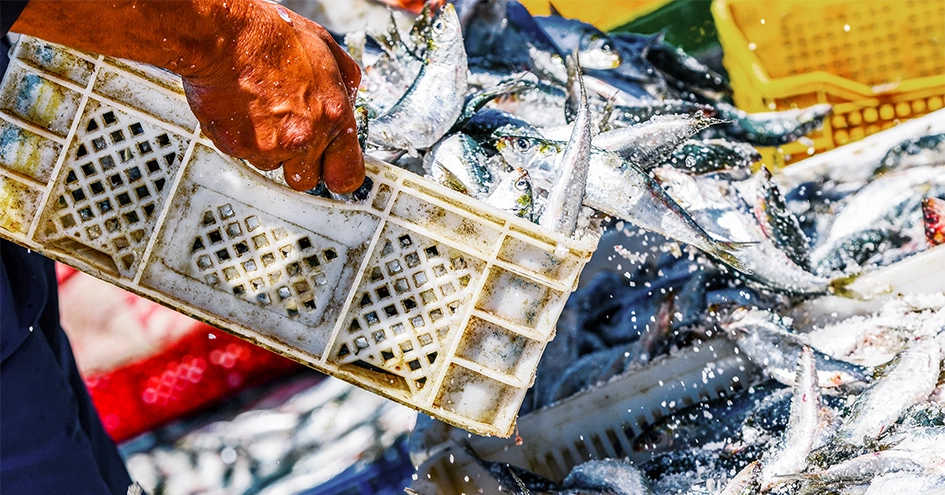Social Audits
Under our social audit programme, we assess our perishables and Private Brand suppliers as to the prevention and mitigation of potential risks of human and labour rights violations, thereby establishing direct contact with workers in the value chain.

Suppliers thus have access to specialised support on social and labour issues and are better prepared for due diligence obligations in their operations and with their own suppliers, leveraging their ability to expand into countries with more demanding labour requirements.
We select suppliers for social audits based on purchase volume (annual volumes of over one million euros) and an evaluation matrix associating products and risk countries1. These supplier audits assess over 125 requirements across 12 dimensions, which include: preventing child and forced labour. preventing discrimination. safeguarding the right of association. contractual terms. working hours. salaries and benefits. health and safety at work. emergency preparedness. among others, existing criteria that we consider to be of “zero tolerance”2.
We have established three audit schemes that incorporate aspects adapted to high-risk social sectors: primary production, operations at sea and the manufacturing industry. These audits have been financially supported by the Group since the start of the programme.
Besides checking the documents provided by management and carrying out a site inspection, interviews are conducted with workers in the value chain to triangulate information and rule out any doubts or suspicions identified during a site visit.
There are two types of employee interviews: individual and group. The selection of interviews prioritises:
- groups that are considered potentially vulnerable (i.e. young and older adult groups, migrant workers, workers on temporary contracts, pregnant workers, and people returning from sick leave);
- workers observed during the visit in a potential risk situation;
- workers belonging to the company’s age and gender averages as a means of representing the majority of the supplier’s workforce.
- In these interviews, topics related to the existence or use of Personal Protective Equipment (PPE), understanding the clauses in employment contracts, or the payment of overtime are often addressed. Interviews are always conducted abiding by the principles of confidentiality and non-retaliation.
Over 420 people employed by our partners were interviewed during the 19 audits performed in 2024, the findings of which are detailed in “Selection and monitoring of suppliers”.
Communication channels are also made available to these workers, such as the Ethics Committee and those provided for in our Whistleblowing Policy. A detailed description of these channels is provided in “Communication channels”.
As part of the social audits, four training courses were held in 2024, covering:
- an understanding of human and workers’ rights;
- analysis of the policy and regulatory environment in the world, particularly in Europe, focusing on social issues that will impact the Group and its value chain;
- our policies and codes that set social requirements for our suppliers;
- the mechanisms available to suppliers and workers in the value chain for reporting wrongdoing;
- the criteria and procedures for social audits.
We believe this is key to contributing to the commitment to eradicate forced labour across supply chains and promote decent working conditions, in line with the International Labour Organization and the principles of The Consumer Goods Forum, where “every worker should have freedom of movement, no worker should pay to work and no worker should go into debt to work or be coerced into it”.
Supplier quality and safety audits
In addition to social audits, we also conduct quality and product safety audits, which also assess labour-related aspects such as workplace hygiene and safety conditions, training, the use of appropriate clothing, hand-washing equipment, rules of conduct and personal hygiene.
Our Sustainable Sourcing Policy and Code of Conduct provide for the possibility of immediately ceasing business relations with suppliers whenever we become aware that these, or their respective suppliers, are in violation of human, children’s and/or workers’ rights or do not incorporate ethical concerns in carrying out their activities.
A detailed description of these auditing processes is provided in “Selection and monitoring of suppliers”.
1 This risk matrix considers the findings of previous audits, where applicable, and we use an international data source (List of Goods Produced by Child Labor or Forced Labor, published by the Bureau of International Labor Affairs, an operating unit of the United States Department of Labor). The latter is informed by surveys conducted by foreign governments in conjunction with the International Labour Organisation, site visits and data collected by the Bureau of International Labor Affairs (ILAB) team, and also quantitative and qualitative studies carried out by various governmental and non-governmental entities, including academic institutions. To learn more, visit the ILAB website.
2 There are up to 26 specific criteria depending on the scheme used – primary production, operations at sea and the manufacturing industry – and these concern the prohibition of child labour and proper age control; the prohibition of forced labour and the existence of an employment contract with clear expectations of duties and remuneration; the guarantee of freedom of movement by prohibiting the retention of workers’ documents; compliance with the maximum number of working hours and the obligation to grant rest days, remuneration and an auditable record of this; the prohibition of acts of discrimination; existence of labour insurance, equipment and emergency assistance mechanisms (medical or firefighting), among others. In the specific cases of audits for primary production or operations at sea, due to the specificities of migratory contexts and seasonality, these criteria include ensuring proper repatriation in cases of contract termination.
